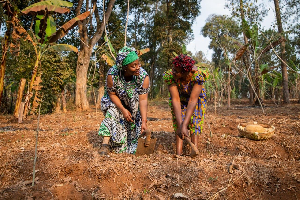As the reopening of air borders indicate a step in the right direction, Ghana’s economic recovery is however projected to be on a gradual scale.
This is as a result of the coronavirus induced closures and restrictions earlier in March this year to curtail the spread of the virus.
Meanwhile, on May 1, 2020, the government through the aviation ministry announced the resumption of domestic flights with safety measures and protocols developed to guide operators to contain the spread of coronavirus on-board flights.
Following the announcement of the resumption of international flights by President Nana Addo Dankwa Akufo-Addo effective today, September 1, 2020, some key sectors of the economy that have been at a halt are projected to witness a boost due to the reopening of the air borders.
GhanaWeb has compiled a list of some key sectors that are likely to witness a revive.
Pharmaceuticals
There has been a prolonged disruption caused by the pandemic in the pharmaceutical supply chains of Indian and Chinese drug makers which has impacted medicine affordability and availability in Ghana.
With the race and search for a COVID-19 vaccine and production of immune-boosting related drugs still on, the pharmaceutical industry is projected to post robust growth in the wake of the air borders reopening as many manufactures and drug developers have had their production and goods halted.
Following the outbreak of the pandemic in Ghana, the cabinet tasked the Finance Minister, Ken Ofori-Atta, to prepare a Resilience and Recovery Plan which will outline how fiscal expansion measures can assist specific sectors of the Ghanaian economy to achieve a growth rebound.
For the plan, special priority is to be maintained in the health sectors.
Tourism and Hospitality
A critical sector that has been impacted by the pandemic has been the Tourism and Hospitality sector.
The sector according to the minister in Charge, Barbara Oteng Gyasi, revealed an operational loss of US$171 million as a result of the pandemic.
Ghana’s Aviation Minister has also disclosed the coronavirus induced closures of air borders has resulted in an operating loss of US$500 million.
For Africa as a whole, the African Union said most countries have lost almost US$55 billion in travel and tourism revenues in the first three months of the outbreak.
Trade and Investment
For the Trade and Investment sectors, global demand and supply chains have been hugely impacted as a result of the pandemic.
The Ghana Investment Promotion Centre in a survey conducted between April and June this year showed foreign investors operating in Ghana, have in the second quarter of 2020, recorded an average revenue loss of US$75,000.
The Centre also forecasted a 40 percent reduction in the workforce of foreign investors operating in Ghana.
The GIPC in its latest report outlines the reduction in the cost of data, further reduction in taxes for manufacturers, tax exemptions on Capital Expenditure as well as the re-opening of the country’s borders will be required to cushion businesses as the detrimental effects of the pandemic unfolds.
Construction
With infrastructure and developmental projects playing a major role on socio-economic livelihoods, the construction industry has not been spared the wrath of the coronavirus pandemic.
The sector plays a major role in increasing its contribution to the overall Gross Domestic Product (GDP) growth.
Meanwhile, the Ghana Real Estate Developers Association (GREDA), has revealed that 50 percent of potential mortgage and housing deals have come to a halt as a result of the Coronavirus pandemic.
The construction sector has also been impacted with an operational capacity of 30 percent for real estate and house developers as a result of the coronavirus pandemic.
Business News of Tuesday, 1 September 2020
Source: www.ghanaweb.com













